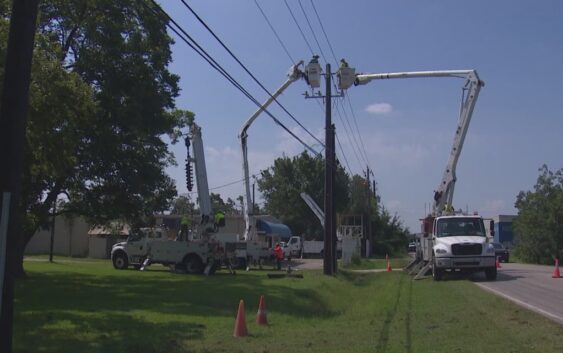- Caught on camera | Tornado touches down in Missouri
- Carolina Hurricanes playoff tickets go on sale next week
- Weather Impact Alert: Cold front could trigger severe weather in Houston area this weekend | See timeline
- Violent storms cut through the South and Midwest, spawning tornadoes and killing 3
- Above-normal active 2025 hurricane season predicted by Colorado State University
Report on Texas power response highlights failures in May derecho, Hurricane Beryl

The report made 14 recommendations from communication, state policy and procedure.
HOUSTON — Two widespread disasters affected Houston over the summer, causing damage and disruptive power outages: the May 16 derecho and Hurricane Beryl which made landfall in Matagorda Bay on July 8. Millions of people lost power, causing Gov. Greg Abbott to call for a report on what caused the “unacceptable” response. The report, released Thursday, listed 14 recommendations.
The Public Utility Commission of Texas reviewed the responses of 16,560 Texans, reports from utilities and emergency managers and weather experts. Their goal was to review the events and preparedness of the utilities and to develop recommendations for the power companies and legislature.
CenterPoint came under fire after 2.2 million customers were left without power after Hurricane Beryl. The last customers were restored to service 11 days after the storm. People dealt with spoiled food and medication, relocation, unplanned expenses and discomfort in the July heat.
Recommendations
- Utilities should include neighboring utilities, local governments, and emergency services in annual hurricane and major storm drills.
- The Commission should require pre-storm communication procedures in emergency operations plans.
- Utilities should incorporate outage tracker disruptions and high user demand as scenarios in annual hurricane and major storm drills.
- The Legislature should codify a customer’s right to information about restoration times and the right to contact an electric service provider by phone.
- The Legislature should consider establishing a framework and penalty structure to assess IOU (investor-owned utility) service quality during major outage events.
- Utilities should assess poles constructed under prior NESC standards for replacement with poles that meet current extreme wind and ice loading design standards.
- Utilities should consider automated grid performance devices, like sectionalizers or automatic circuit reclosers, to reduce unnecessary outage times and help restoration crews locate and resolve faults more quickly.
- In more densely vegetated areas, utilities should assess whether to replace distribution lines with covered conductors.
- The Commission should require utilities to establish a designated method for customers to report vegetation hazards.
- Utilities should use analytics-based vegetation management strategies to augment, not replace, cyclical vegetation management plans.
- The Legislature should consider increasing the penalty cap for electric service quality violations.
- Utilities should scale up training in emergency response and Incident Command Response.
- Utilities should ensure a resilient emergency communications platform is available to both local and mutual assistance crews.
- Utilities should pre-identify critical customer locations suitable for the deployment of Temporary Emergency Electric Energy Facilities.
Recommendations seven through nine deal with clearing vegetation, which caused power poles to fail when trees and limbs fell on power lines. Half of CenterPoint’s outages in Hurricane Beryl were due to vegetation. The report found that trees were more vulnerable because of freezing temperatures, drought and heavy rain in recent years.
A KHOU 11 Investigates report reviewed expenditures on vegetation removal. For utilities serving the Greater Houston area in 2023, some companies spent double or triple what CenterPoint spent per customer. Here’s how much each company spent:
May 16 derecho
A fast-moving storm hit Southeast Texas causing 1 million power outages. Winds topped 100 mph in places.
Hurricane Beryl
The hurricane left 2.7 million power customers in the dark, with 2.2 million of those being CenterPoint customers. The outages disrupted daily life and were aggravated by inaccurate information or a lack of communication from CenterPoint.
Read the full report here.